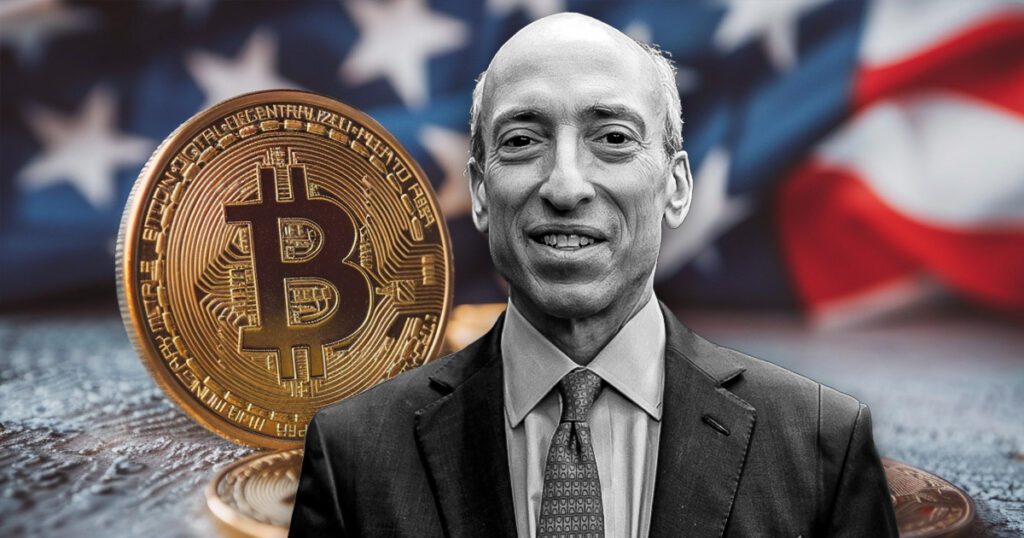Gary Gensler, Chairman of the United States Securities and Exchange Commission (SEC), delivered a detailed speech on November 14 at the PLI Annual Institute on Securities Regulator. His remarks highlighted the SEC’s approach to crypto regulation while repeatedly identifying the difference the SEC sees between altcoins and Bitcoin.
The language Gensler used also alluded to the possibility of resigning after Donald Trump’s election and the president-elect’s explicit criticism of Gensler’s tenure. He ended his speech with what can be seen as a farewell message,
“The SEC and its staff. It’s a remarkable agency… It’s been a great honor to serve with them, to do people’s work…
I have been proud to serve with my colleagues at the SEC who, day in and day out, work to protect American families on the highways of finance.
In what may be one of his final statements as SEC chairman, Gensler took the time to reaffirm Bitcoin’s classification as an insecure asset, setting it apart from the vast majority of the crypto market. Gensler said:
“Not all assets constitute security. Former Chairman Clayton and I have both stated that bitcoin is not a security, and the Commission has never treated bitcoin as a security.
Instead, we focused on some of the approximately 10,000 other digital assets, many of which the courts found were offered or sold as securities.
This stance contrasts with the agency’s enforcement actions against other digital assets, which collectively represent 5-7% of the SEC’s regulatory focus since 2018.
The speech highlighted why the SEC is targeting specific altcoins. Gensler emphasized that compliance with securities laws ensures market confidence and investor protection. “History for 90 years has shown that strong securities regulation creates confidence in markets and fosters innovation,” he said. However, he acknowledged that many digital assets (besides Bitcoin) still lack sustainable use cases, highlighting speculative investments and illicit activities as main concerns.
A critical point of Gensler’s remarks was the emphasis on his endorsement of exchange-traded products (ETPs) for Bitcoin futures, spot Bitcoin and Ethereum. Gensler highlighted how these approvals mark a departure from previous SEC chairs who limited access to physically-backed crypto ETFs.
According to Gensler, by approving Bitcoin and Ethereum spot ETFs, the SEC helped provide benefits such as disclosure, reduced fees and competition, comparing them to “non-compliant crypto-asset markets.”
Trump’s victory in the November election adds a new dimension to Gensler’s tenure. The president-elect has publicly committed to replacing Gensler, a stance that may explain the president’s reflective tone. “Effective administration of the SEC promotes trust,” Gensler remarked, apparently framing his legacy as part of a broader institutional mission.
Bitcoin, which has surged more than 30% since the election results were announced, illustrates the market’s sensitivity to political and regulatory forces. Analysts have linked the recovery to optimism over possible deregulatory policies under the Trump administration. Bitcoin hit $93,400 on November 13, fueled by expectations of reduced regulatory oversight.
Gensler’s remarks also contextualized crypto’s place in the global financial ecosystem. He noted that outside of Bitcoin, Ethereum and stablecoins, the remaining crypto market – worth around $600 billion – constitutes less than 20% of the total crypto capitalization . This subset, he argued, poses the greatest compliance challenges due to its fragmented and speculative nature.
Amid speculation about his resignation, Gensler concluded his speech with personal reflections on the importance of securities regulation, comparing their role to the “rules of the road” in financial markets. Whether his term ends soon or extends into the next administration, Gensler’s approach to crypto regulation has left a lasting imprint on the industry.
Gensler appears to be framing his tenure as SEC chairman as being pro-Bitcoin, pro-Ethereum, and pro-stablecoins. However, Coinbase, Kraken, Crypto.com, Robinhood, Ethereum Stakers and many other industry players may not be convinced by his pitch. From this speech, he seems to believe that Bitcoin differs fundamentally from altcoins and that only Ethereum and stablecoins escape the SEC’s jurisdiction.

